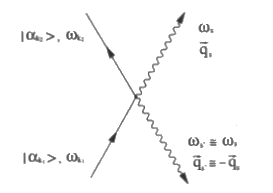
A stimulated second-order Raman scattering process. The subscript k1 (k2) represents the higher- (lower-) energy incident coherent photons. The arrows show the directions of the corresponding photon and phonon momenta. The incoming coherent photon beams are about parallel to each other. The actual physical process is as follows: an incident photon in mode k1 interacts with a solid, producing two acoustic phonons, and leaves in mode k2. For appropriate choice of initial phtoon and phonon states, the acoustic phonons can be in a two-mode squeezed state. Notice that there are also additional incoming photons in mode k2, therefore this mode becomes stronger after the interaction, at the expense of mode k1. Also notice that the vector sum of the two phonon momenta is the difference of the input and output photon momentum vectors. Since photon wave vectors are generally much smaller than the phonon ones |ki| << |qs|, the two acoustic phonon modes have nearly opposite wave vectors ±qs. This figure is not to scale. The appropriate scale in the figure would make all four lines of photons and phonons vertical and almost parallel with each other. For the sake of clarity, we have increased the angle between them.
Image Source: X. Hu, Quantum Fluctuations In Condensed Matter Systems,
UM Ph.D. Thesis, 1997, Page 59.
X. Hu and F. Nori, UM Preprint, 1995; Physical
Review Letters 76, 2294 (1996); Physical Review Letters 79,
4605 (1997).